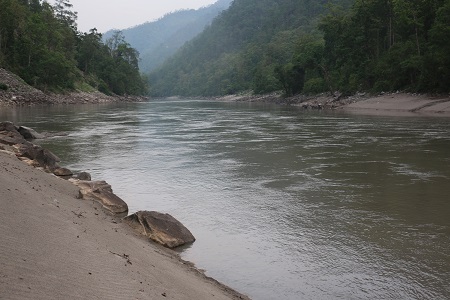Preparations for giving final shape to Pancheshwar DPR by October
 Ramesh Lamsal (Kathmandu) / July 7: Preparations have been made to give final shape to the Detailed Project Report (DPR) of the Pancheshwar Multipurpose Project until October.
Ramesh Lamsal (Kathmandu) / July 7: Preparations have been made to give final shape to the Detailed Project Report (DPR) of the Pancheshwar Multipurpose Project until October.
It has been agreed in the fourth joint meeting of the Energy Secretaries of Nepal and India that concluded on Wednesday to give final shape to the DPR and finalise all issues, Chief Executive Officer of the Pancheshwar Development Authority Mahendra Bahadur Gurung said.
According to him, agreement has also been reached to hold the secretary-level meeting every three months and resolving the issues by synthesizing the problems.
Gurung stated that the joint meeting prepared the basis also for the benefits and the loss that Nepal and India would get from the project, the use of technology, inundation, rehabilitation and the additional topics that have to be incorporated. He said the DPR was not immediately given the final shape so as to make it more enriched by the coming October.
The Pancheshwar project which had been stalled since the last 23 years was moved forward after the Indian Prime Minister Narendra Modi’s visit to Nepal. Four joint meetings on the project DPR have been held so far.
“The decision of the fourth meeting will be formalised within two weeks,” Gurung said. The Authority has projected to generate a total of 5,040 megawatts electricity from the project. Of this projected power to be generated, 4,800 megawatts would be generated from the Pancheshwar project while 240 megawatt from the Rupaligad project. The project will produce11,885 gigawatts/hour annually.
As has been proposed in the DPR, the proposed cost of the project is Rs 500 billion. Nepal and India will have to make equal investment in the project.
Similarly, the two countries have also come to a common view regarding the sharing of the water of the Mahakali River.
A total of 18 thousand million cubic metres of water is stored in the Mahakali Pancheshwar dam annually. Of this 12 million cubic metres water is being used in various ways and of the remaining 6000 million cubic metres water, Nepal will use 3073 million cubic metres water while India will use 1924 million cubic metres water. One thousand one hundred seventy six million cubic metres water has to be released in the river.
Nepal will get Rs 34.50 billion annually from the project. Similarly, the country can make a significant income by way of fishery, carbon trade, irrigation, tourism, herbs and fruit farming based on the project. RSS
